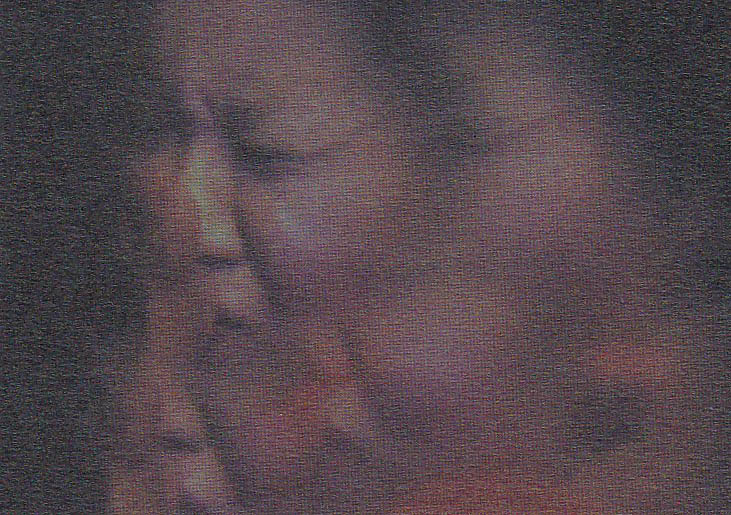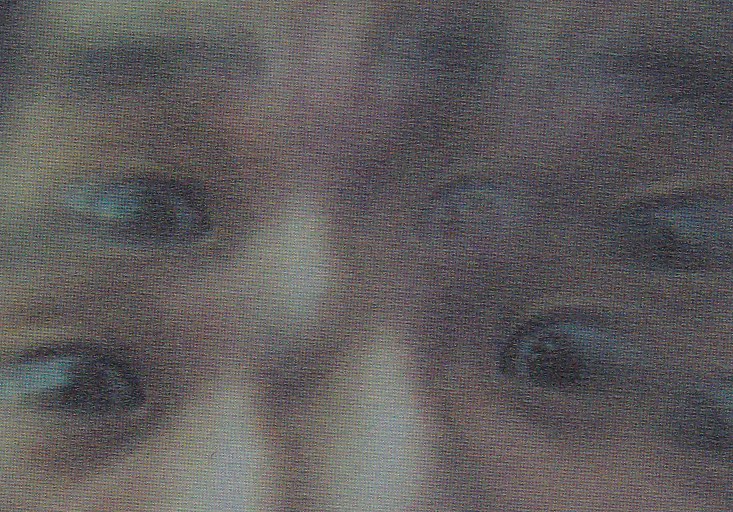| english | 日本語 | ελληνική | deutsch |
|
terre thaemlitz writings 執筆 |
|
Deproduction - Terre Thaemlitz |
Originally posted on comatonse.com October 17, 2017. Excerpt of accompanying text to the album Deproduction / 不産主義 (Japan: Comatonse Recordings, 2017), C.027.

Project Summary
Deproduction is a multi-media album by Terre Thaemlitz, sold as an 8GB SDHC card containing audio (48k/24bit AIFF files), video (86 min., HD 1920x1080) and texts (PDF). It was released on December 28, 2017 (JP: Comatonse Recordings, C.027). Two 12" vinyl EP's containing remixes by DJ Sprinkles were released in April, 2018 (JP: Comatonse Recordings, C.027.EP1 & C.027.EP2). The project was produced with support from documenta 14 and Akademie der Künste der Welt, with the world premiere at documenta 14 in Athens on July 9, 2017.
We live in an era in which dominant LGBT agendas are increasingly revolving around themes of family, matrimony, breeding and military service. The cultural terms for social analyses and organizing around such issues requires an aggressive capitulation to peculiarly Western Humanist notions of the nuclear family, as well as private and public space. As a result, Feminist and Queer critical rejections of family structures (nuclear and otherwise) are increasingly scarce. An ability to understand the abuses of family and domestic violence as symptoms of larger institutionalized dominations becomes virtually impossible.
In a stereotypically familiar and heteronormative manner, the anticipated promise behind today's Queer families is nothing more than the egocentric notion that familial abuses will be resolved by this generation being better parents than the previous generation. What is forever absent are discussions of what it means to deliberately not be a parent, and to deliberately abandon family. They remain as taboo as the notion of celebrating the relief of an abortion.
In Deproduction, Terre Thaemlitz investigates the awkward, uncomfortable and hypocritical power dynamics behind Western Humanist notions of family, and how they function internationally through processes of globalization.
Audio
- Names Have Been Changed (Sound/Reading for Incest Porn)
Duration: 00:43'00 (h:m's) 48k/24bit AIFF
(Excerpt / 抜粋) 1:00 986K MP3 128kB/s - Admit It's Killing You (And Leave) (Sound/Reading for Gay Porn)
Duration: 00:43'00 (h:m's) 48k/24bit AIFF
(Excerpt / 抜粋) 1:00 986K MP3 128kB/s - Bonus: Admit It's Killing You (And Leave) (Piano Solo)
Duration: 00:14'10 (h:m's) 48k/24bit AIFF
(Excerpt / 抜粋) 1:00 986K MP3 128kB/s - Bonus: Names Have Been Changed (Sprinkles' House Arrest)
Duration: 00:10'41 (h:m's) 48k/24bit AIFF
(Excerpt / 抜粋) 1:00 986K MP3 128kB/s - Bonus: Admit It's Killing You (And Leave) (Sprinkles' Dead End)
Duration: 00:14'39 (h:m's) 48k/24bit AIFF
(Excerpt / 抜粋) 1:00 986K MP3 128kB/s
Video
-
Deproduction
(EN) Duration: 01:16'00 (h:m's) HD Video 1920x1080 48k/320kB/s Audio
不産主義
(JP) Duration: 01:16'00 (h:m's) HD Video 1920x1080 48k/320kB/s Audio
Text
-
Deproduction
(EN, JP, GR, DE)

Deproduction Part I
Names Have Been Changed (Excerpt)
Sound/Reading for Incest Porn
Reiko
Reiko was in her third year of high school, watching the latest Japanese television drama about single motherhood. Last year she enjoyed a drama about a heroic fifteen-year-old mother. This one was about a woman in her twenties. The main characters were always beautiful, humble, at times confused, but ultimately able to tap into a maternal instinct that conquered all. Their children were adorable, quiet, even profound―except in brief scenes with comedic music showing the moms exhausted by their kids’ endless energy. Being a single mom was apparently hard, but worth it. Whatever problems arose could be overcome through inner strength and the loving support of family. Solutions to the problems of single motherhood did not come from the public sphere. The private lives of Japanese women were changing, but public society was stable. The shape of Japanese families was changing, but the importance of family was stable. Next came the evening news. North Korea was at it again. "It’s so sad," said Reiko’s mother, "they grow up with so much propaganda they don’t know what’s real."
Gary
Gary was twenty-three when he misused a condom with his partner of two years. He stayed inside her after ejaculating, semen leaked out of the base of the condom, and she got pregnant. Although both had always discussed having an abortion if she accidentally got pregnant, she refused to do so. He pleaded with her not to have the baby, for her sake as much as his, but ultimately it was her choice. Gary had to respect that. At the same time, he couldn’t allow himself to be forced to play the role of a father to an unwanted child. He knew a spiteful family was not a healthy one, and told her if she insisted on having the child she would be on her own. That was how they ended. After the birth her lawyers established Gary’s paternity, and the state began deducting child support from his wages. Fifteen years down, three years to go.
[...]
Michiko
Michiko was thirty when she got pregnant. She hadn’t known her boyfriend long, but felt she was already past the age of settling down, so she married him and quit her job. Her agreement to his proposal was as robotic as the proposal itself. The wedding was formulaic, containing all of the latest ceremonial trends. A pre-fabricated house was bought on loan. Sex basically stopped with the birth. The three of them shared the same bed for the first year, then he moved to a separate room to get more sleep. In many ways it was a relief to rid the nights of what little sexual tension remained, and Michiko immersed herself in child care. Now seven years had passed, their child was in school, and she found herself with more time on her hands. A boredom began to consume her. She was sure her husband had a lover, so she began to search online for one of her own. Just for play. Nothing that could ever be a threat to her family. Maybe a foreigner.
Salma
Salma was twenty-nine, her daughter seven. It was time to arrange for her daughter’s "vacation cutting"―a special girls trip for female circumcision. What the World Health Organization unfeelingly called "Type 2 FGC," the removal of the clitoris and inner labia. They would fly from the cold of Minnesota to the warmth of Florida, and the warmth of a female doctor who understood what Salma wished for her daughter. She felt it ironic that a wish for her daughter’s health, womanhood, and social acceptance was also what isolated her community from the world at large. This was women’s business. This was how she herself had grown into a clean and healthy woman. A cleanliness proven by her problem free delivery of a beautiful daughter who had lived a life of nothing but good health. Salma saw the media portraying parents like her and her husband as unloving monsters, but she was sure the opposite was true. This trip was precisely about preventing her daughter from growing into an unlovable monster.

Craig
Craig loved his vasectomy. He loved taking total responsibility for his own birth control, as well as the sexual freedom it gave him and his long-term partners over the years. At the same time, he was always fascinated by the odd and even ridiculous first reactions certain women had to the news of his procedure. Some women didn’t believe him at first, thinking it was just a line from a guy who didn’t want to use condoms. Several confused it with castration and a loss of testosterone, presuming he now either had erectile dysfunction or dry ghost ejaculations. Others said they were turned off by the idea of sex with a man who didn’t have the potency to impregnate them―even though they didn’t want to get pregnant. They insisted it made more sense for a woman to have a hysterectomy, even though it was a more complicated and risky procedure. A few even called him mentally ill and selfish, saying he was "sick" and asking what he’d do if someday he met a younger woman who wanted a baby. Funnily enough, he noticed, they all came to love it too. The humor in people being so quick to judge his convictions, only to cast their own aside, was never lost on him.
Amber, Jasmine & Corey
Amber, Jasmine and Corey were triplets resulting from fertility drugs. Their two moms always laughed,"One-third planned, two-thirds surprise!" Now aged twenty-four, the three were writing a collective master’s thesis on the social repercussions of high rates of in vitro multi-births within lesbian communities. Growing up they occasionally met kids like themselves―usually twins―but it wasn’t until college that they formally established a network with the others. Together they discovered patterns of eating disorders among the girls, and depression across genders, in one case leading to suicide. All stemming from the contradictions of lesbian endeavors to nurture individualism while relying upon a faulty fertility industry that risked multi-births for quick results. Jasmine coined a term for the ensuing crisis, "Intersectional In Vitro Homogeneity."

Debbie
Debbie was fifteen when she got pregnant. Her family had moved from Wisconsin to Arkansas two years earlier. They were white and so were all their neighbors, except one black family with a son who was two years older than Debbie. He was the father. His family hoped Debbie would have an abortion, but her devoutly Catholic parents wouldn’t even consider it. Adoption was the only choice to be made. She was too young to be a mother, too young to ruin her life with a baby. With a black baby. The other neighbors were already calling her a "nigger lover." And him a rapist. Her family would have to move back to Wisconsin, she would leave school for a year, deliver the baby, and then give it up. That was her cross to bear. After the baby was given away, she could start anew. God willing. For her parents and their priest, this was the most rational and compassionate response for all parties involved.
[...]
Karl
Karl went to all of the bigger anti-abortion rallies in his mid-sized Iowa town. He was not an organizer, nor part of the daily abortion clinic blockades, but a follower. One of the faithful. A believer in life. In his fifties, Karl was the self-described son of a mean drunk. As a result he never drank, but behind closed doors he still abused his own family―like father, like son. His weathered protest sign was written in gothic script, "Adoption Not Abortion." He had one of his daughters write it for him years ago. With time she had grown to disagree with Karl’s politics, ultimately causing a rift in the family by volunteering to escort women past protestors at the local clinic. It was during one of their arguments that Karl revealed the long kept secret his own devoutly religious mother had been pregnant with him out of wedlock. "If your grandmother could’ve had an abortion I wouldn’t even be here," he cried,"I thank God every day, she couldn’t!" Suddenly she saw his politics in a way that eluded Karl himself. His protesting wasn’t about all those mothers-to-be, or unborn children. It was just about him and his own sense of self preservation. Just another selfish way to put himself first in the world. First before his own mother.

Angel
Angel was only nineteen, but already giving birth to her third child. Like the first two pregnancies, this one was an accident. A blessing. Her third blessing, gifted to her through cultural prohibitions on birth control and abortion in the Philippines. The only advice her village health office had to offer was on uterine fatigue and the importance of waiting two years between pregnancies. Both Angel and her boyfriend were unemployed and couldn’t afford the costs of a hospital birth, so a midwife aunt was asked to do the delivery. Everything seemed okay as Angel’s labor began, but as the day passed it became clear something was wrong. Still, the aunt was confident things would be fine. After a struggle, the baby emerged, followed by an endless river of blood that gushed Angel into unconsciousness. The aunt immediately called for a motorcycle taxi to rush her niece to the nearest hospital. Within moments a bike with a cracked muffler roared up. As the teen’s limp, blood soaked body was loaded into the side car, even the bike’s hellacious clanking couldn’t cut through the cries of family. Even its rattle couldn’t wake her.
Jeannie
Jeannie was fifty-seven and pregnant. She didn’t truly believe it herself until a third test also read positive. Was the universe playing a sick joke? After a lot of inner reflection, speaking with her husband, and her gynecologist, she decided to keep the baby. Once past twelve weeks, she began sharing the news with family and friends. There was an escalating excitement about her pregnancy that became infectious. Everyone rallied around, their skepticism and concern gradually swayed by Jeannie’s conviction. Her husband even began reconverting his den, which he made from an empty bedroom after their youngest child moved out, back into a kid’s room. Now, seventeen weeks into the pregnancy, she was sitting on the toilet and bleeding profusely into the bowl. She was panic-texting in Line with her younger sister, who texted back to put a towel between her legs and squeeze tightly until the ambulance arrived. (Cony rabbit hugging Brown bear Line sticker.) (Ambulance emoji.) (Bored Brown bear looking at watch Line sticker.)
Taki
Taki’s old Japanese house still used a pit toilet, like an indoor outhouse. Every year or two there was news of a woman giving birth into such a toilet. The last case was a woman from Okayama Prefecture who called the fire department to rescue her newborn from the cesspool. She claimed she didn’t even know she was pregnant until the baby dropped into the pit, injuring her as it violently pulled the placenta with it. Both survived, but what nonsense, Taki thought at the time. She must have tried to kill her baby, but then got scared. It was the only thing that made sense. Like most people, Taki couldn’t fathom one in two-thousand-five-hundred pregnant women experienced "pregnancy denial," often lasting until labor. Sometimes longer. Now as Taki sat on a similar toilet, buckled over with pain from what she similarly assumed was constipation, all hints of her own cryptic pregnancy eluded her. Shock blinded her senses. Unlike the woman from Okayama, she remained oblivious to what was happening even after the baby emerged. Her baby dropped, but the toilet’s hole was too narrow for it to fall through. If it was making any noise, her state of mind didn’t allow her to hear it. Twelve minutes later the placenta passed. She stood, grabbed a toilet brush and―mustering her nerve as if about to empty a bloody mouse trap―rammed the blockage down.
Adam
Adam had raped and impregnated a thirteen-year-old girl. Still, his uncle assured him everything would be okay. Tunis police officials had filed charges against him, but her family would have them dropped if he married the girl. His uncle had gotten her father to understand their shame and hardship would be greater if Adam went to jail. Everyone had much more to gain by allowing Adam to marry her. After all, he was twenty, fit, employable, respectable. His uncle said the marriage would make things right between him and the courts. Him and God. Him and the girl. Adam’s child would surely heal her. True, it was not an ideal way to start a family, but nobody could deny it was one way. His uncle said most parents everywhere encourage marriage for their daughters who fall early into a family way. "Have more children," he smiled consolingly, "Building a large family will bring healing to all." Adam thanked his uncle and promised to have many children.

Kei
Kei was a network engineer at a major Japanese corporation. She started gender reassignment when she was almost forty. As a man she had married, fathered two children, and built a successful career. Now she was the first person at her firm―at any firm that large―to transition on the job. She was a test case, setting corporate precedents that affected not only her, but generations to come―all of which created tremendous pressure to be perfect. Once her transition was legally completed, she would be transferred to another branch and given the chance to socially start anew with her colleagues as a woman. Only upper management would be aware of her special circumstances. Kei’s wife, by contrast, was not so accommodating. Overwhelmed with disgust and betrayal, she immediately kicked Kei out of their house, filed for divorce, and forbid physical contact with their children. Kei was only allowed to speak with her kids once a month, by phone and on the contingency she not let them know their father was turning into a woman. This originally seemed doable, but as her feminine voice training and hormone therapy took hold she now had to struggle before each call to regain her former voice. Kei looked into the mirror with a tough-guy face, repeating over and over, "Hey... it’s dad."
Kevin
Kevin was thirty-one when he started staying longer in his daughter’s room after story time. She was turning ten. He wasn’t drunk that first night, just tired. He had dozed off while reading to her as he so often did, but awoke to his aroused body hugging hers. Without thinking, he allowed his erect penis to continue pressing against her leg as she slept. Kevin told himself it meant nothing. It was another several months before he started making her touch him with her hands. Never more. In Kevin’s mind this wasn’t abuse. He believed he wasn’t capable of abuse. That she wasn’t scared of him. That she wouldn’t even remember as she got older. What’s to remember? It was nothing, he thought. Just a touch. Certainly not rape. Kevin had been raped as a child. If there was one thing he knew, it was that he could never rape his little girl.
Yuko
Even before the sex was over, Yuko knew she was pregnant. Over the next week she felt her breasts become sore, and a hormonal surge begin to convince her to keep an unplanned child she knew she didn’t want. The feeling seemed so chemical, artificial, manipulative, desperate. As someone who had struggled for years with pre-menstrual mood swings, she always hated the notion of her hormones defining her. She saw how they had already left her branded hysteric and unstable in both her personal and work lives. Now she felt her hormones trying to brand her a twenty-seven year old single mother against her will. Why should she allow this current wave of hormones to have even more power over her life than the others? She picked up the phone, dialed the women’s clinic, and made the appointment for the abortion.

Deproduction Part II
Admit It's Killing You (And Leave)
Sound/Reading for Gay Porn
There isn't much time. We'll have to skip the foreplay. For some of you this will require suspensions of disbelief, but please open yourselves to the following two premises.
First, having children is unethical.
Second, families make democracy impossible.
The first can be interpreted two ways. On the one hand, unethical as in devoid of ethics. There is nothing inherently ethical or moral about having children. It's just a random biological process. So random that despite historic levels of information and access to birth control, forty percent of the world's pregnancies are unintentional. On the other hand, unethical as in wrong. I agree with both views, but considering how people are so often told having children is the very purpose of life, I advocate the latter. One can easily argue that it is unethical to bring another human being into this shit world. To conspire to impose a life—with all of its tears, dependency, suffering, violence, cruelty, injustice, poverty and prejudice—upon a totally unknown human being without them having any choice in the matter, right down to their birth bodies, makes one an uncaring person. Especially if one is acting out of boredom, loneliness, or a desire for an indentured caretaker in one's old age. To egotistically presume another person would and should appreciate decades of forced dependency upon you in particular, despite how you surely mismanage so many aspects of your own life just like everyone else, by some ethical standards makes one an irresponsible and manipulative person. A bad person.
As for the second, family social structures make democracy impossible because they are unrescuable from the problems of human ownership, coerced labor, sexual fascism, gender segregation, and gender exploitation. This is particularly true of patriarchal families, although not limited to them. Since patriarchal families perpetually dominate post-agrarian social relations, all democratic or egalitarian projects past, present and future are already compromised beyond realization. This fact contradicts typical associations of democracy with continual emergence, growth and springtime. However, pragmatically they can only be projects of collapse.
Those are our starting points. Having children is unethical. Families make democracy impossible. They are not up for debate. They are simply dynamics of this world of breeding and families. Absorb them for a moment. Pause your urge to interject exceptions, in all likelihood defensively starting with your own family. Consider the impulse to immediately contradict and complicate these ideas as a socially conditioned response. One that keeps you, me, and all of us from being able to critically analyze the cultural primacy of breeding and families. Invert the knee-jerk tendency to insist miserable and violent families are the exception, and happy homes the rule. Develop empathy.
For those of you who have children, believe for the moment you are liberated of all taboos against admitting you regret ever having kids. Research shows those few parents who don't experience declines in their emotional, material and sexual qualities of life are generally rich and satisfied to begin with. That's not you. You tried. It wasn't what you thought. Your DNA wasn't special or needed by the world after all. And admitting this in no way contradicts your love for your kids—if, in fact, you do love them. If not, kudos for the courage it takes to admit that.
Of course, the recognition that having children is unethical is not to be confused with a desire to empirically stop people from breeding. It is simply pointing out an irony underlying centuries of societies using religions and other institutions to morally enslave our sexualities to the breeding of sons of men. Policies so violent that the fictions required to culturally maintain them on a large scale must literally take on biblical proportions. Remember, the god of the Old Testament's command to "go forth and multiply" was directed at slaves. It is no surprise, then, that for most people breeding requires a leap of faith. Faith in one's child as an extension of oneself. Faith in their having a future better than one's own miserable life. Faith that is in this context selfish and naive. From within the meat grinder we tell ourselves it's right to produce more meat for the gears, denying our ability to withhold that meat and render them useless.
Indeed, declining populations in Japan and elsewhere show that the flawed mathematics of perpetual-growth capitalism rapidly crumble when the meat is withheld. For over a century, macho radical leftists have sought quick ways to bring about the collapse of capitalism, gender-blind to the fact that the most effective and non-violent solution rests firmly in the hands of women. Clearly any revolutionary project must by necessity also be a feminist one. At the same time, I am sorry to say that given the insurmountability of entrenched global patriarchies that predate capitalism by centuries, this is precisely why the revolution never comes.
While first-world nations panic over declining populations, the reality is that this planet already has more people than it can sustain, and our numbers are still increasing. For sure, it takes far more conscious thought, effort and education not to have children than to have them. Thirteen million teen pregnancies around the world annually testify to that. Therefore, any local panic over declining birth rates is ultimately a panic over border controls and immigration. A panic through which nations police the flow of people in ways that are hypocritically irreconcilable with the first-world's own migratory origin story—that borderless evolutionary flow of prehistoric humanoids freely following resources out of Africa to other regions of the globe.
Any ruling nation's prioritization of the necessity to proliferate its own genetic makeup, rather than expanding its immigration policies, is always a project of xenophobia and racism. It is about breeding out the other. An other upon which one's society stands. An other one rapes, both metaphorically via resources, and literally via sex trades and spousal visas. It is a contemporary version of the nobleman's jus primae noctis. First-world cultures espousing the need to breed becomes a political distraction from the actual socio-material causes for their unsustainable lifestyles. It is a distraction from the capacity to revolt, to reposition oneself in relation to imposed nuclear family lifestyles of imbalance.

It goes without saying, the decline in first-world births is directly linked to those cultures' capacities for sexual self-direction and access to birth control. Capacities that arose through the emergence of capitalism, and an increased ability for more privileged members of society to exist through chosen forms of labor outside traditional agricultural-based families. Nineteenth century birth control movements were explicitly entwined with anti-poverty campaigns, educating on the relationships between large families and poverty. Reproductive rights were an ethical response to the unrestrained cruelty of life. Our ancestors realized having smaller families, or not having children at all, unarguably increases one's own quality of life economically, emotionally, and sexually.
Yet for many people, this sounds selfish. Conceited. Immature. Indeed, on the culturally macro level first-world lifestyles are internationally perceived as marked by those very traits. This, despite cultural rhetoric about our egalitarianism. In order to continue domestically denying that macro-reality to ourselves, it is on the micro level that individuals without children are singled out and accused of being the embodiments of those undesirable qualities. We are shamed and branded as "free-riders" refusing to pull our own weight—despite our taxes contributing to public education and social services for other peoples' children.
In fact, the people most likely to accuse us of selfishness are those whose social and world views are the most isolated to the service of their own conceited family fantasies. Their myths of a universal parental instinct can only continue to tug at the heart strings through a collective denial of the historical fact that billions of parents have emotionally crippled, beaten, raped, starved, chained, disowned, orphaned and murdered their own children. As someone coming from a family with multiple generations of adoption, including my great grandfather and sister, claims to instinct in this day and age strike me as particularly insulting. If one's capacity for empathy and caring is limited to blood relations, that makes one pretty shallow. Anti-social, even. From a logical perspective, it is also at odds with the supposed love bond between parents in a traditional nuclear family, whom I presume are not blood relatives.
While people turn inward to their families with expectations of personal freedom and pleasure, they are more likely to find economic exhaustion and an inability to conceive of their collective public potential. Their individual potential, however, will continually be dangled before them via democratic rhetoric like a dollar on a string. Meanwhile, without exception, all self-described "democratic" cultures continue to rely upon slightly over half of their populations being born into a gender-based lower caste of unpaid or comparatively underpaid women. That is, underpaid in comparison to the majority of men who are also underpaid.
Despite talk of gender equality, today's democratic patriarchies strategically depend on the gender-caste divide. Greed driven business leaders know that wage equality would destroy their profit margins, make our already debt-based societies even more unsustainable, and result in economic collapse. More importantly, wage equality cannot occur without a radical restructuring of domestic labor. Not just dad chipping in on the housework, but a complete redistribution and rethinking of domestic labor outside of the private sphere. Outside of moms and dads. It is the preservation of patriarchal family models that ensures such a restructuring never takes place. Truly, families make democracy impossible.
With all of this in mind, it's no coincidence that today's global proliferation of capitalist privatization and anti-socialism comes hand-in-hand with a hefty dose of pro-family propaganda. To borrow the words of UK labor organizer Tony Benn, the deliberate "restoration of power of those who always controlled the world" can only occur through the destruction of hard fought social services in first-world democracies—along with ensuring they never fully emerge in industrializing cultures. And that can only take place through a reinscription of family as the primary site for social care. It culturally necessitates family values for all walks of life. Enter the contemporary same-sex marriage movement.
Today, most people see same-sex marriage as an ethical debate about the right to publicly express one's love for whomever they choose. In fact, it is an ongoing struggle for access to social privileges. While the same-sex marriage movement has a long history, its current visibility is largely the result of HIV/AIDS activism in the US during the '90s. Accepting the cultural impossibility of socialized health care, energies were desperately redirected to spousal rights as a stopgap solution for quickly expanding the number of insured gay men. In addition to spousal health coverage, legal recognition of same-sex marriages would grant partners family visiting rights in hospitals, the ability to make health care decisions when a partner is incapacitated, the right to remain living in an apartment leased under a partner's name after their death, shared child custody rights, and a wide variety of other privileges.
However, selling a homophobic public at large on each of these varied social issues would be far more difficult than simply repackaging the debate as an ethical right to marry. And that is largely how the argument remains framed today. So much so that even most queers are unaware of the broader histories and issues in play. These days, supporting same-sex marriage just seems like the liberal thing to do. The fair thing to do. Common sense. Meanwhile, what I would argue to be a more compassionate and ethical "sense" to dismantle those exclusionary matrimonial institutions altogether is further rendered uncommon.
It is important to remember that a key function of social services is the increased ability for people to exist outside of familial dependence. Such services emerged in no small part from the struggles of women, queers and gender-others to exist despite disownment or detachment from their families. Obtaining basic independence may not seem like a big deal to a certain privileged section of contemporary first-worlders, but historically speaking it is something new, extremely radical, and still largely unthinkable in much of the world. Therefore, much as "disco sucks" campaigns masked broader cultural sentiments of racism and homophobia, so do today's commonplace rants against the "welfare state" mask sentiments against diversity, women's independence, the ability to exist as something other than a male dependent, and the poverty experienced by socially ostracized gender and sexual outcasts.
In specific relation to gender and sexual outcasts, how do cultures go about convincing us to go along with rollbacks in already insufficient social services? The simplest option is to invite us black sheep of heteronormativity to return to our clans. Homecomings that involve officializing and re-regulating our legal relationships to those clans. Liberal humanist cultures are recognizing they do not need to demand our heterosexuality. They only require our heteronormativity. This is what underlies today's mainstream "queer moment." Business culture understands most of all that sexual orientation doesn't matter, so long as the collective goals of private wealth, full-time labor, credit-debt, mortgaged home ownership, family, and military service are publicly upheld.
For many of us the promise of finally being allowed to partake in the American Dream sounds like the deal of the century. After all, we grew up internalizing the same bullshit aspirations as the next person, and despite persistent myths of our innate creativity, we have just as little imagination as everyone else. As Amy Gluckman and Betsy Reed had already observed in the mid-'90s, whereas the Queer Nation slogan, "we're here, we're queer, get used to it," once promised to stretch straight peoples' concepts of morality, family and politics, queers who reaped the benefits of corporate acceptance have been quick to promise the world, "we're here, we're just like you, don't worry about it."
Our own desperate stopgap plan to create and exploit a loophole of same-sex marriage has been ideologically co-opted, flipped and sold back to us as an all-around solution for queer fulfillment. Whereas just a few short decades ago we primarily fought for our decriminalization—a project that is by all means far from even begun—we are now more likely to demand our legal re-regulation. We demand it as a human right, as opposed to recognizing it as human bondage. We organize around it far more than any demolition of the tyrannical family systems that have crushed us for centuries. In the end, a murderously abusive father's patriarchal love is apparently more valuable than one's autonomy from such a monster. More valuable than love found elsewhere, or love of self. So much for our PrideTM.

As a result, feminist and queer critical rejections of family structures are increasingly scarce. By extension, publicly understanding the abuses of family and domestic violence as symptoms of larger institutionalized dominations becomes virtually impossible. What is forever absent are discussions of what it means to deliberately not be a parent, and to deliberately abandon family. They remain as taboo as the notion of celebrating the relief of an abortion—something that certainly should be granted public space for celebration, given the obvious human suffering and hardships averted. I recall Mark Fell once explaining with some irony that, "from a utilitarian standpoint, the momentary suffering that a fetus might experience—if any—is infinitely less than a lifetime of being conscious. So on those grounds, the morally correct thing would be that everyone should have an abortion."
In a stereotypically familiar and heteronormative manner, the anticipated promise behind today's queer families is nothing more than the egocentric notion that familial abuses will be resolved by this generation being better parents than the previous one. Any radical engagements with the material conditions of intra-familial human ownership are substituted with fantasies of finding the right way to raise a child. Sadly, self-congratulatory public claims of our own capacities to nurture are fueled not only by conventional parental hubris, but a broader need to convince the world that we—as people historically branded sexual predators of children—are in fact capable of caregiving. It becomes a defensive reflex, to the point that I have witnessed several prominent queers pat their own backs about their parental prowess at queer symposia. A prowess that strikes me as better judged by their children than themselves. To state the obvious from the audience's side, we're not the ones in need of convincing, and I'm sure I'm not the only one who dislikes being used as a prop in public performances of parental self-congratulation.
The dominant re-regulation of homosexuality via same-sex marriage is paralleled in transgendered communities by a deafening emphasis on essentialist gender transitioning. Popular discussions of trans experiences are restricted to trans-women and trans-men, precisely because those dualist approaches to gender variance are the most reconcilable with the heteronormative female/male binary. They also happen to be the most lucrative approaches for medical industries in the servitude of that binary. It is no coincidence that today's massive scientific and medical interest in clinically "treating" transgenderism is booming at precisely the moment when "treating" homosexuality has fallen out of favor in most first-world cultures. Billions of dollars in research funding have been redirected away from sexuality towards gender—all the while facilitating the same clinical imposition of heteronormativity.
Clearly, the business of developing care systems for one particularly binary-reconcilable model of transgenderism at the exclusion of all others is a sign of the times. A liberal humanist reinscription of the gender binary upon more varied transgendered experiences around which people have been organizing for decades. In the US, the transgendered ideal on sale is Caitlyn Jenner, an essentialist, trans-womanist, financially elite, right-wing Republican supporter of Donald Trump. Humanist legislation around trans-issues follows suit, focussing on the right to be gender categorized as one chooses, as opposed to an ability for all people to legally step away from gender categorization. As with same-sex marriage, the essentialist transsexual movement plays an active role in reselling the notion of regulation over deregulation. Simultaneously, the trans experiences most rendered unspeakable are those of non-transitioning and non-medicated bodies. They must remain inconceivable, in no small part because they conjure that ultimate bureaucratic taboo of non-identification.
All of this sets an unquestionably cruel stage for the raising of children. Despite common beliefs in nurturing individuality, children expressing doubt in social conventions are consistently met with medical intervention. Much as alcohol and tobacco industries target youth in order to prime them as future consumers, young non-conforming minds become particularly targeted for hormone blockers, anti-depressants and other pre-transitional clinical therapies. While overzealous parents are increasingly skeptical of giving their children basic vaccines, when it comes to the treatment of gender variance, radical side effects such as stunting the growth of the brain and other organs is a risk to be taken. This is ostensibly done to grant children the space and time to come into their own sense of female or male gender-being. Yet, in the absence of non-binary gender options, one might argue it is all but expected that people having difficulty with the gender identifications socially forced upon them would be inclined to fall into states of dysphoria. Minds are socially starved of non-patriarchal identifications through which to envision their own bodies. Poignantly, within the US seventy percent of such children choose to stop all treatments by the age of twenty, often left with questions as to how their bodies would be had they never stunted or redirected their growth.
Online, countless blogs written by "supportive" parents talk about how much their trans-kids are teaching them. Essentialist transgenderism from the mouths of babes. These parents invariably deploy a nativist fetishization of childhood, extending typical projections of innocence and purity to a pre-socialized wisdom about gender. This strikes me as an ideological inversion. I read such testimonials as saying less about the innate wisdom of children, and more about the distressing ignorance of the heteronormative adults raising them. Most parents have very low levels of awareness around gender issues, starting with their own internalized binary identifications. This is true even within queer communities. When this is combined with the active and often intimidating coaching of medical professionals, it is no wonder that children expressing discomfort with their gender-branding are more likely to be given pills than basic feminist tools. Tools to help them understand that, yes, of course it makes sense for people to feel unhappy about their imposed gender identifications within binding patriarchies. Of course! This isn't difficult to comprehend. Every little girl who kicks and screams when forced to put on a dress is already halfway there. The problem is in societies' refusal to change despite this admission. And this is where feminist tools for coping and organizing contribute to individual health. Feminism teaches people how the personal is political. In doing so, it clarifies many public dynamics underlying our private struggles with gender and sexuality, as well as a wide variety of other social issues. This can reframe the reasons for individual feelings of insufficiency, failure, shame, guilt and incorrectness—which in turn has the potential to refocus what needs or doesn't need changing in oneself, as well as the world around them. This is not just an existential exercise. A deep history of feminist social organizing provides strategies for acting upon and surviving inequity.
Meanwhile, first-world gender counter cultures have taken root in which hormone cocktails and surgical procedures are, by and large, treated like tattoos, piercings and other trends in body modification. While the plasticity of their relationships to the body may present commendable counterpoints to mainstream transsexuality's bureaucracy, as with many tattoo and piercing subcultures one quickly finds them drowning in romance for tribalism and clansmanship. And as with the recent cultural mainstreaming of tattoos and piercings, an unconscious resonance between tribalism and a dominant resurgence in conservative family values is in play. Many gender counter cultures deploy a pseudo-anthropological reimagining of non-Western, non-bourgeois communalism that bears the hallmarks of orientalism. It denies the often intensely prescriptive social limitations of who one may be within the confines of tribal life. It also creates a problematic framework of recontextualization through which these counter cultures attempt to learn from impoverished, third-world, non-binary gender experiences—practices often developed in the absence of or without regular access to health services. Of course, the more desperate, high-risk and dangerous third-world practices that would spoil first-world fantasies of such peoples' self-determination are usually filtered out. For example, reshaping bodies through direct and uncontained injections under the skin of liquid silicone, fats and other chemicals. As with most first-world performances of looking beyond oneself, there is no real solidarity or understanding of suffering on offer. Only select appropriation and absorption of those actions that might contribute to a first-world sense of PrideTM.
While counter-institutional dignity is often invoked by these first-world counter cultures, it is precisely within sites of Western cultural institutionalization that they are most visible and organized. Particularly within universities and art institutions. Queer- and gender studies programs, exhibitions and archives have become motivational workshops for celebrating a fantasized capacity for cultural self-actualization. They peddle positivity and hope to a youth market like every other sector of global capitalist culture. Of course, economically this optimism is a requirement of academic recruitment and job preservation. A concession that becomes internalized to the point of constituting a celebratory politics of failure. A punkish glorification of the rebellious allure of failure without any organizational engagement of its risks. With a knowing wink, analyses of our violent oppressions become synonymous with the jock slogan, "no pain, no gain." All wrapped in a ribbon of hypocritical morality and self-censorship, whereby describing oneself as "tranny," or even "transgendered" with an "-ed," becomes labeled an aggression to others. Meanwhile the reappropriated term "queer" itself somehow remains magically acceptable despite its own history as a term of gender and sexual warfare. An ongoing history that, for my own usage, is the only reason why the term has any reappropriative use value to begin with. Again, it strikes me as more than coincidence that these counter cultures fixated on PrideTM and neo-tribalism find institutional support and funding at this particular moment in time. Despite grand intentions of deviance, our leading counter cultural praxes remain typical of today's anti-democratic, pro-familial backlash.
While this may sound like needlessly frank criticism to some, recognizing the unwittingly symptomatic aspects of our own critical movements reminds us of the inescapable. There is no win. No communist utopia on the horizon. No revolution able to be had. The global stranglehold of patriarchal family ties is too great. Therefore, to persist amidst this collapse of aspiration, a complete rethinking of what it means to align oneself with democratic and egalitarian projects is required. If conventional models of democracy have been grounded in teleological notions of proliferation, perhaps a more meaningful and timely model might be one that recognizes its aspirations as mad in the eyes of most. The anti-familial, anti-traditional madness of desiring to kill the patriarch, the king, the father. A threatening madness at the heart of Western modernity that most people outside the West immediately felt, long before Roland Barthes and his French literary contemporaries philosophically clarified the death of the patriarchal author figure as a historically emergent stance.
If one uses egalitarian logic, the hierarchical family is utterly antiquated as a sanctioned cultural site for sexual expression, breeding, continuation of community, and continuation of the self. It is a site of sexual power and repression, not fairness or equality. Of blood ties, not social freedoms. Of mandates, not referendums. Of roles, not indeterminateness. From before birth, people have no choice in whether they enter this world, in which bodies, or which classes. As such, promises of children's potential and mobility are always overshadowed by the reality of instilled dependencies. Family remains a feudal micro-kingdom—the epitome of anti-democratic social organization. And yet, despite contemporary Western democratic values being in obvious antagonism with conventional clan-based and extended family structures, "family values" remain at the heart of most first-world political rhetoric and media. The ensuing hypocrisy makes it easy to understand why many third-world cultures see the first-world's continued blindness towards its own anti-familial tendencies as requiring a level of denial that verges on neurotic.
Amidst the madness, the nuclear family introduces its own demented restructuring of incest taboos. Curiously unnoticed by most, it is within the nuclear family that the tensions of incest are amplified to historic levels. In extended family configurations, aunts, uncles, cousins, second cousins, and others of varying relative distance commingle under common roofs. Possibilities for culturally acceptable sexual exchanges beyond one's own father and mother exist, even if often frowned upon. For example, in most cultures you may marry your cousin. By contrast, in the nuclear family consisting only of two parents and their direct offspring, all sexual interactions outside of those between the parents are explicitly taboo. In its sexual limitations, the nuclear family represents the most intensely repressive and inflexible sexual familial constellation imaginable. Apparently, the less family makes sense democratically, the more extraordinary its configuration of internalized repressions must become.
In classic fashion, this intensity of potential for incest is matched by an intensity of moral rhetoric about family values and sexual propriety. Morality that is mind bogglingly sanctimonious considering the abusive power relationships at the center of the archetypal Christian family. As legend has it, a patriarchal god figure who narcissistically declared himself the beginning and end of all things birthed a son out of wedlock, Adam. He then physically interacted with the son to incestuously produce a daughter, Eve—making Adam both her father and brother. The children were denied education, and encouraged to incestuously populate the world. When they touched their father's belongings without permission and attempted to educate themselves, he got furious and kicked them off his property. After a few thousand years of ignoring his bastards, the god returned to have another child—insisting it be a boy—with the premeditated intention of the child being brutally murdered after a life of persecution. Without the women of the world having any say in the matter, he took his pick and choose a young virgin named Mary as the mother-to-be. He then sent one of his cronies to stalk her in the middle of the night and threaten her impending rape. As she was a descendant of his children, and likely under sixteen years of age given the era, the impregnating rape of the virgin Mary was also incestuous and pedophiliac. And once again, as with Adam and Eve, the god was a delinquent father. His share of parental responsibilities were left to an emasculated Joseph. In the words of Roger the alien from American Dad, "Christianity, my favorite deadbeat dad story. Check it—God fathers this kid and then disappears. And then when the kid becomes famous, God wants him to come live with him. The exact same thing happened to Shaq. He did a rap about it called ‘My Biological Didn't Bother.'" Considering the collective denial required for billions of people to perceive such parables as timeless moral examples for their own families, this is not the kind of repressed cultural trauma that is unpacked easily—if ever.

In the wake of centuries of brutally imposed conversions of faith, and recognizing the absence of prospects for dismantling family relations, radical democratic projects committed to reducing violence would be well served by distancing themselves from conversion-based organizing. Conversion was behind old left fantasies of replacing family systems with collectives, and continues in new left adaptations of pro-family agendas—such as that of the Japanese Communist Party, which is almost neo-conservative in its appeals to populism. Neither envisions the organization of anti-familial spaces and social services that are understood as necessitated by the problems of, yet concurrent with, ongoing family systems. Of course, anti-familial spaces are incredibly difficult to envision when the majority of social service rhetoric speaks to serving the family. In particular, the functions of supporting single-parent and impoverished families. Social services are only imagined as a means to fill the gaps where family support is inadequate, all of which obfuscates the notion that they can provide explicit relief from family ties. Socially, such separation from family remains undesirable to most. Unfair. Heartbreaking, even. Utterly unsellable on any mass scale.
This is in no small part because market researchers are working overtime selling us on a different message. Business leaders understand that capitalism works better with slavery than with labor equality, as proven by the West's own history of slavery, as well as the contemporary expansion of capitalist business practices in non-democratic countries. The global estimate of current victims of forced labor is twenty-one million people. Most are held hostage in deplorable working conditions, often in a foreign country with their papers held by their captors. In the sex trade, human trafficking takes over the lives of more than two thousand new people every single day. The average cost to buy a slave is eighty euros.
In relation to the global south, first-world workers are privileged house slaves. Exchanges of monetary payment for socially mandated labor participation, ongoing debt, and prescriptive breeding to replace oneself in the labor force when one becomes too old to work, amounts to what comedian Justin Roiland calls "slavery with extra steps." We see the rest of the world as our enemies wanting to take what little we've managed to scrounge together, rather than grasping that our most wealthy are the ones withholding from everyone. Our fearful greed serves the elite more than ourselves. It makes us envision we are closer to them than the global south. Closer to an unreachable Donald Trump than to the homeless people we pass daily, terrified of admitting the opposite is true. Meanwhile, all of today's globalization is happening with the conspicuous absence of the establishment of any new democratic nations.
The era of state and social projects is over. Traditional enemies of state and nationhood have been largely replaced by enemies of clan and faith. The Cold War has become the War on Terror. All of which involves a reinscription of the cultural power of family, dynasty and birthright. A necessary reinscription since, in addition to families providing social services, they also provide the subconscious psychological groundwork necessary for accepting dictated social relations. The psychological groundwork for slavery. Through cultural and legal endorsements of the parental ownership of children, and conversely the traumatic youthful awareness of being owned by one's parents, we internalize the notion that all of us are possessions owned by someone. As with gender and sexual binaries, this internalization does not mean we agree with the idea, but it does condition and restrict our imaginative capacity to respond to it. We prefer to think parental ownership is benign, as well as personal and relegated to the private sphere. We tend to criticize only a father or mother's private bad parenting skills, with little criticism extending to the public institution of parenting itself. Yet if we recognize the private sphere as a site of labor exploitation, then we must also admit parenting's inseparability from such exploitation. Thus our being owned by and owning families is systemically inseparable from, and integral to, our public serfdom.
Most anti-democratic atrocities of liberal humanist globalization occur as the result of expansionist tendencies. For example, the demands for irresponsible and unsustainable economic expansion, increased consumption, aggressive border controls, and multiplying populations. These are contemporary reformulations of that engrained and ancient order to go forth and multiply, which long predates capitalism. The ensuing contradictions between contemporary democratic ethics and praxes are so extreme that it becomes clear globalization is no more a project of democratization than the USSR or PRC were ever projects of communism. It deploys similar techniques and generates just as extreme horrors. Consider the Big Brother-esque monitoring of citizens revealed by Edward Snowden, or the West's construction and division of the modern Middle East, or waterboarding at Guantanamo Bay, or communal displacement and homelessness caused by speculator driven gentrification projects, or self-serving industrial polluting, or arms trades that result in countless injuries, rapes and deaths, and so on.
Combine this with the post-modern understanding that humanity is not on a predestined teleological path of progress, and it becomes possible to reconceive of committed democratic praxis as something small, odd, queer. An act of localized harm reduction rather than global conversion. This active disassociation from expansionism is especially vital to more radical democratic praxes on the spectrums of socialism and communism. Particularly in rejection of the legacies of totalitarianism historically enacted in their name. And a massive part of this means perceiving that democracy is not compatible with success.
Some of you are surely thinking that sounds like the queer politics of failure criticized earlier. No, there is no silver lining of creativity or self-actualization behind this. If the censorship of radical queerness is entwined with the censorship of radical democratic organizing, then let's consider gender transitioning as a metaphor for that organizing. Transsexual access to medical care has historically gone hand in hand with a formal diagnosis of Gender Identity Disorder (GID). A mandatory self-identification with the psychotic and ill becomes a ritual of cultural initiation and acceptance. It also becomes the key to personal momentum and standardization. The advocates of the politics of failure work hard to find ways to position this momentum in relation to the achievement of goals, and personal and communal fulfillment. Gateways to broader safety and social acceptance. It is an optimistic model of failure that still serves notions of progress and accomplishment. A celebration of the potential for transition.
What if one refuses to celebrate normalization? What if rather than responding to the violence of being forced to self-identify as ill with a demand to be recognized as healthy, one responds with a politicization of the desire to be recognized as healthy? What if one allows themself to remain disturbed by the unavoidable anti-feminist compromises of binary gender transitioning under patriarchy? What if one's entire relationship to gender variance is one of collapse? Of unbecoming? Of time, but not of a journey? Of change, but not of transition? Of struggle, but not of achievement? What if one responds to shame by strategically refusing PrideTM? This is the grimly realist, anti-globalist, anti-humanist model of democratic engagement being proposed.
Just as the strategies of mainstream transsexuality are simultaneously framed by and symptomatic of contemporary globalization, so is democratic organizing linked to time and contexts via extremely specific relationships between cultural momentum and psychosis. Whatever momentum this realization offers, it is not one of normalization. It is not about hope. The lesson on hand is not motivational. It is about nihilistically confronting the situational. In practical terms, it involves responding to the brutality of social isolation by organizing spaces and services for safely living alone. It requires reacting to differences in individual needs with tools other than petit bourgeois individualism, or conversion-based community building. Tools other than those designed for possessing a family/clan/tribe, or being possessed by one. It is simply about wiggle-room to survive disowned.
I was reminded about these things the other day while riding the train in Tokyo. The car was overpacked with heteronormative bodies, all crushed to immobility. Strangers in need of wiggle room, trapped between the snares of work and home. The ride was nonsexual for most, predatory for a few of the men, and threatening for many of the women. Over the years, while dressed as a man I have been groped twice by drunk office women myself—a gender-reverse manhandling specially reserved for foreign males. I got off the train and entered a McDonald's filled with children. The walls were decorated with forcefully typeset slogans like, "You CAN have whatever YOU WANT," and "I want to be BEAUTIFUL IMPROBABLE." Predictable capitalist marketing slogans standardizing greed and vanity, but also contextually referencing a parent's routine promise to their child that they can order whatever they want at McDonald's, and a weird confession to the improbability of achieving conventional beauty standards on a fast-food diet. Variations on the almighty lie that children can achieve whatever they can dream. A lie most people today consider not only ethical, but necessary for healthy social development. I suppose part of the presumed harmlessness of this lie is the fact that dreams from a child's mind are invariably cheap, mirroring the cheapness of the cultures in which they are raised. So cheap, yet still so unachievable in reality. Between the restaurant's wall murals, the children's attempts to control what they ate, and the parents' attempts to get them to eat it, it all seemed like a stage of actors. A community theater troop performing a poorly executed black comedy about how having children is unethical and families make democracy impossible. The families, like a trip to McDonald's itself, were a desperate stopgap plan. The origin of that most orthodox of dreams that one day you can admit it's killing you, and leave.